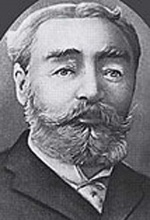Template:AOW297: Difference between revisions
Hari singh (talk | contribs) (Created page with '{{aowh2|Max Arthur Macauliffe|Max Arthur Macauliffe|<small>birthday September 10</small>}} {{pm|File:Macauliffe2-m.jpg|Max Arthur Macauliffe}} '''Max Arthur Macauliffe''' ([…') |
Hari singh (talk | contribs) No edit summary |
||
| (2 intermediate revisions by 2 users not shown) | |||
| Line 1: | Line 1: | ||
{{aowh2|Max Arthur Macauliffe|Max Arthur Macauliffe|<small>birthday September 10</small>}} | {{aowh2|Max Arthur Macauliffe|Max Arthur Macauliffe|<small>birthday September 10</small>}} | ||
{{pm|File:Macauliffe2-m.jpg|Max Arthur Macauliffe}} | {{pm|File:Macauliffe2-m.jpg|<small>'''[[Max Arthur Macauliffe]]'''</small>}} | ||
'''[[Max Arthur Macauliffe]]''' ([[10 September]] [[1841]] - [[15 March]] [[1913]]), | '''[[Max Arthur Macauliffe]]''' ([[10 September]] [[1841]] - [[15 March]] [[1913]]), an English translator of the [[Sikh scriptures]] and historian of early [[Sikhism]], was born on [[September 10]], [[1841]], at Newcastle West, Limerick County, Ireland. | ||
He was the first author to bring the [[Sikh faith]] to the attention of the "educated intelligencia" of western world. | |||
The focus of Maculiffe's life | He was educated at the Newcastle School, Springfield College and Queen's College, Galway. He received a broad humanistic education that allowed him to read the Greek and Latin classics in the original. He also read French and Italian. | ||
At the examination of 1862 he was chosen for the Indian Civil Service and was assigned to the [[Punjab]] where he joined his appointment in February 1864. He reached the grade of a Deputy Commissioner in 1882 and became a divisional judge two years later. | |||
His career in the Indian Civil Service has received no special historical note. Although his deep understanding and sympathy for the people of Punjab and their religious traditions doubtless made him a popular civil servant with the people of Punjab, it also brought him into conflict with his fellow Englishmen in [[India]].<!----- | |||
The focus of Maculiffe's life was in his work as a translator and interpretor of [[Sikhism]] to the English-speaking world. His interest in Sikhism was sparked by attending a [[Diwali]] celebration in [[Amritsar]] shortly after arriving in [[Punjab]]. In order to understand ceremonies and the importance of the [[Golden Temple]], he undertook a study of Sikhism and especially of the hymns of the [[Gurus]]. He found himself deeply engaged by what he studied because of the "sublimity of their style and the high standard of ethics which they indicated." ----->{{aowf|Max Arthur Macauliffe}} | |||
Latest revision as of 06:09, 10 September 2010
Max Arthur Macauliffe (10 September 1841 - 15 March 1913), an English translator of the Sikh scriptures and historian of early Sikhism, was born on September 10, 1841, at Newcastle West, Limerick County, Ireland.
He was the first author to bring the Sikh faith to the attention of the "educated intelligencia" of western world.
He was educated at the Newcastle School, Springfield College and Queen's College, Galway. He received a broad humanistic education that allowed him to read the Greek and Latin classics in the original. He also read French and Italian.
At the examination of 1862 he was chosen for the Indian Civil Service and was assigned to the Punjab where he joined his appointment in February 1864. He reached the grade of a Deputy Commissioner in 1882 and became a divisional judge two years later.
His career in the Indian Civil Service has received no special historical note. Although his deep understanding and sympathy for the people of Punjab and their religious traditions doubtless made him a popular civil servant with the people of Punjab, it also brought him into conflict with his fellow Englishmen in India. .....More

